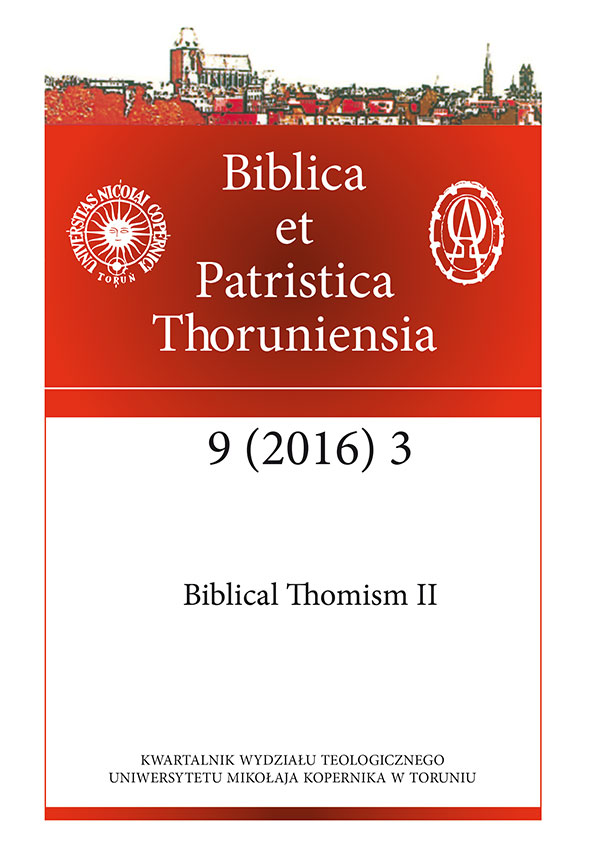The ideal of tolerance in light of the premises contained in the Letters of St. Paul (Part Two: implementing rules)
DOI:
https://doi.org/10.12775/BPTh.2016.028Keywords
tolerance, intolerance, to judgeAbstract
This article is a continuation of thepaper published in the previous issue of "Biblica et Patristica Thoruniensia" that discussed the preliminary study, including the analysis of 1 Cor 8-10, which showed that tolerance is subordinated to love and, as such, it does notconstitute any absolute or autonomous value.In this paper, various implementing rules related to both tolerance and intolerance were identified. Christians should be tolerant of "outsiders" and intolerant of evil committed by "those inside [the Church]" (1 Cor 5:12-13), within the limits set by the apostolic authority (1 Cor 5:3-11). Assuming that tolerance in the Church is a consequence of love, and that its limits are set by the apostolic authority, it may be concluded that there is a significant sphere for decisions in the life of every Christian in which they should show tolerance for mistakes made by other Christians. In Rom 14, St. Paul mentions three different sets of circumstances under which the attitude of tolerance is recommended (see: Rom 14:15.19.22). In Rom 12:1-2 and 1 Cor 6:1-11, there is an answer to the question about how Christians can "translate" the Gospel of tolerance to everyday reality. They should be guided by reason (enlightened by the Holy Spirit), and their attitude should constitute the realization of "higher justice" based on the Gospel, which is different from the wisdom of this world.
References
Fee G. G., The First Epistle to the Corinthians, Grand Rapids1973.
Grabner-Haider A., Tolerancja, w: Praktyczny Słownik Biblijny, Opracowanie zbiorowe katolickich i protestanckich teologów, A. Grabner-Haider (red.), T. Mieszkowski, P. Pachciarek (przekład i opracowanie),Warszawa 1995 (oryginał: Freiburg im Breisgau 1969), s. 1320-1321.
Jougan A., Słownik kościelny łacińsko-polski, Warszawa 1992.
Pesce M., Le due fasi della predicazione di Paolo. Dall’evangelizzazione alla guida della comunità, Bologna 1994.
Petuchowski J. J., La Voce del Sinai. Letture rabbiniche sui Dieci Comandamenti dagli scritti ebraici e aramaici, Napoli1985.
Rad von G., Teologia Starego Testamentu, Warszawa 1986.
Rafiński G., Z problematyki genezy pism z Qumran (w 40. rocznicę pierwszych odkryć), Ruch Biblijny i Liturgiczny 40 (1987), s. 465-476.
Rafiński G., Rozum jako źródło wartości moralnej czynu ludzkiego w Liście św. Pawła do Rzymian, w: Miłość jest z Boga. Wokół zagadnień biblijno-moralnych. Studium ofiarowane ks. prof. dr. hab. Janowi Łachowi, M. Wojciechowski (red.), Warszawa 1997, s. 335-357.
Rossano P., La lettera ai Romani e il suo influsso sulla cultura europea, w: P. Rossano, R. Penna, U. Vanni, A. Rigobello, E. Bianchi, R. Di Segni, Attualità della lettera ai Romani, Roma 1989, s. 31-47.
Völkl R., Christ Und Welt nach dem Neuen Testament, Würzburg 1961.
Downloads
Published
How to Cite
Issue
Section
License
CC BY ND 4.0. The Creator/Contributor is the Licensor, who grants the Licensee a non-exclusive license to use the Work on the fields indicated in the License Agreement.
- The Licensor grants the Licensee a non-exclusive license to use the Work/related rights item specified in § 1 within the following fields: a) recording of Work/related rights item; b) reproduction (multiplication) of Work/related rights item in print and digital technology (e-book, audiobook); c) placing the copies of the multiplied Work/related rights item on the market; d) entering the Work/related rights item to computer memory; e) distribution of the work in electronic version in the open access form on the basis of Creative Commons license (CC BY-ND 3.0) via the digital platform of the Nicolaus Copernicus University Press and file repository of the Nicolaus Copernicus University.
- Usage of the recorded Work by the Licensee within the above fields is not restricted by time, numbers or territory.
- The Licensor grants the license for the Work/related rights item to the Licensee free of charge and for an unspecified period of time.
FULL TEXT License Agreement
Stats
Number of views and downloads: 952
Number of citations: 0



